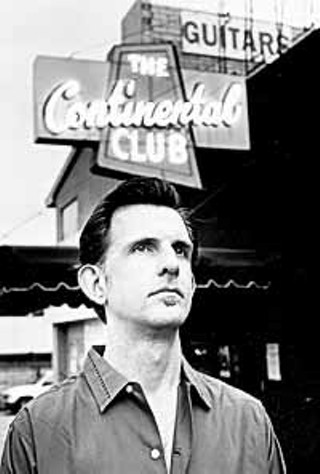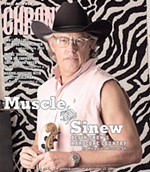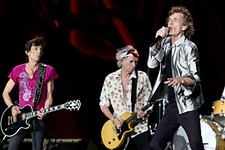Sad Stories and Steel Guitars
Tearjoint Troubador Ted Roddy's Country Soul
By Christopher Gray, Fri., Nov. 10, 2000

Tear Time, Ted Roddy's first recording since 1995's Full Circle and the first under his velveteen-country Tearjoint Troubador guise, is perhaps best appreciated by toting up the numbers. Nine of its 15 songs are set in a bar, honky-tonk, tavern, dive, or establishment where one is likely to hear music with steel guitars and sad stories. Four take place on the road. Alternately drinking tequila with eager señoritas in a border town, dancing with a partner that's "got somebody at home who treats me like a stepping stone," and extinguishing his sorrows at "a place where lonely people like to come sit around and cry," the Austin mainstay has problems with his love life on more than one occasion. Nine, to be exact.
This particular tally doesn't count sure-things that missed the cut, live staples like "Motel Time Again," or any one of Roddy's impeccable covers; when he wants to do Doug Sahm, it's "Crazy Crazy Crazy Baby," for Merle Haggard he turns to "The Fugitive," and his amber-flecked baritone grabs hold of Willie Nelson's "Ain't It Funny How Time Slips Away" like a longneck at last call. He's also fond of doing songs written by his friends, as with Joe Dickens' "I Like Whiskey" and Homer Henderson's "Beer Cans on the Highway." Two weeks ago at the Hole in the Wall, the Troubadors did "Snakes Crawl at Night" and "The Devil in Mrs. Jones," but then again, it was Halloween.
Roddy found the name for his current project in a musty, nearly forgotten bit of jukebox gold by Dan Penn and Donnie Fritts. Starting with the classic turn of phrase, "This ain't no beer joint -- naw, it's a tearjoint," an invitation to "watch this old loser cry" turns tragic real quick when "all the right that turned out wrong suddenly comes back strong." The Troubadors' instrumental shadings both reflect and rebel against this sort of despondency: The tear-in-your-beer leads are the perfect backdrop for elbow-bending, but the choppy, steadfast guitar and Roddy's juiced harmonica runs always bring the song (and the singer) back from the brink of despair. A sad song or two always beats a night in the drunk tank, and a really good one makes the other side of the bed seem a little less cold.
Then again, neither is the neon life on Tear Time all bad. The narrator meets a kindred spirit in "Let's Drown Together," and they proceed to get "tighter than the barmaid's sweater." By the time he stumbles upon "I Like Whiskey," he's back "honky-tonking on a Saturday night," no longer afraid the jukebox is going to dredge up old memories. Marty Muse's agile pedal steel spells out a perfect two-step as surely as those feet that light up on the dance floors of Seventies-era discos. The feeling carries through "The Goodurn," a sparkling harp instrumental Roddy wrote as a way of paying tribute to his inspirations Charlie McCoy and Norton Buffalo.
It was inspiration that found Ego's giving the Troubadors a weekly residence shortly after the band's formation in 1996. Not only did the music strike a blissful balance of country, rockabilly, and soul, but the scene itself was riveting. Tucked away in a concrete parking garage, this cellarlike club beckoned with its surreal combination of Christmas lights, finger paintings, and wayward souls. It was the ideal environment to be introduced to eventual Tear Time selections like "Let's Drown Together," "War Between Two Loves," and "Presence Known," because they might as well have been made up on the spot. Long after Melrose Place grew stale and predictable, Monday nights at Ego's were thick with the furtive wisps of tawdriness suggested by the wandering eyes and drowning egos of the Troubadors' repertoire.

Even though those Monday night gigs ceased a year ago next month, the Troubadors' tried-and-true recipe remains intact. Now comfortably established in the Tuesday happy-hour slot at the Hole in the Wall, the site of Roddy's first gig after moving here from Dallas in 1985 (he played drums), the band also makes regular appearances at other dimly lit Austin shrines like the Carousel Lounge, Broken Spoke, Continental Club, and Ginny's Little Longhorn. And since he's been in Austin 15 years now, Roddy's list of stage and studio Troubadors reads like an honor roll of local instrumental talent: Muse, Tear Time co-producer Jim Stringer, Dave Biller, Lisa Pankratz, John X Reed, Kevin Smith, Brad Fordham, Dave Wessolowski, Dave Sanger, Terry Kirkendall, Andrew Nofziger, Landis Armstrong, Jon Hahn, Randy "Tater" Glines, Chris Johnson, and Darcie Deaville.
The Troubadors are a direct outgrowth of what Roddy is probably best known for among Austin non-musicians: the twice-a-year Graceland Revues at the Continental Club. For a decade now, on the day Elvis was born and the day he died, Roddy fronts a full Vegas show band (horns, synthesizers, backup singers, the works) and thrusts his way from "See See Rider" and "Return to Sender" to "Can't Help Falling in Love" and "Suspicious Minds" with no irony or camp whatsoever. Even his choice of outfits for the big nights is telling: Roddy eschews the stereotypical rhinestone-studded jumpsuits, oversized aviator shades, and superhero capes for the semi-formal, dinner-jacket attire favored by Elvis' idol Dean Martin.
Similarly, whereas much of Elvis' later material ("In the Ghetto," "An American Trilogy") caused many to snicker at the onetime King of Rock & Roll's descent into unchecked schmaltz (see also "Bridge Over Troubled Water"), Roddy plows through it all with unapologetic reverence, each time restoring a little more of Big E's lost dignity and majesty. Elvis has long been a beacon to Roddy for his instinctive ability to get inside a song, be it blues, gospel, Broadway, swampabilly, or whatever, and make it uniquely his. Because he believes so strongly in Elvis' shamanistic power, it's no sweat for Roddy to get the audience -- packed houses every time; many many repeat customers -- to believe.
"Elvis to me is like a spiritual thing, where all that stuff comes together," explains Roddy. "To me, he embodies where all of that meets and works. It's sort of like a religious holiday when we do those. Musically speaking, it is that, because it brings everything that I love into one deal."
Furthermore, Roddy liked the Revue's male-female vocal interplay so much, he made a point of incorporating it into the Troubadors. To that end, he enlisted local singer-songwriters Karen Poston and Teri Joyce as his "Sparkling Teardrops," charged with furnishing sweet aw-shucks harmonies and the occasional solo turn like "I Never Promised You a Rose Garden." Joyce eventually moved on to devote her energies and talents to the Tagalongs; Poston continues to divide her time between the Troubadors and her own Crystal Pistols. The he-said/she-said dynamic Roddy constructed adds even more immediacy and authenticity to the songs of not-so-innocent barroom flirtations and lovin' on the sly.
"I really like singing with another person," nods Roddy. "I really feel like in country music, you need some harmony in there. It's very hard to get by without it."

Though on the surface they're country as a feed-store calendar, the Troubadors are in reality a culmination of Roddy's numerous musical identities over the years. A typical evening at the Tearjoint will include the ragged rockabilly of the Talltops, suave cocktail crooning of the Naughty Ones, Little Walter-inspired harmonica gymnastics of his most recent project, Shakerag, and once in a while, even an Elvis standby like Chuck Berry's "Promised Land." Other songs, like the tribute to his hometown Corpus Christi "Sparklin' City by the Bay," surfaced on Full Circle, which he liked, but now sees as "a rush job" that didn't get ample opportunity to breathe.
As a junior high schooler in Corpus, Roddy found his first musical direction with two older cousins after his grandmother bought him a snare and the family band started providing the entertainment at "ice-cream socials and stuff." He remembers their set lists as Creedence-style tunes and "basically jams -- long extended things that touched on Hendrix, touched on a little blues."
He would go see what he calls the "lower echelon of touring acts" at the city's coliseum, including Humble Pie, Trapeze, and a female Jimi Hendrix impersonator who called herself Electric Lady. The biggest eye-opener came when he went to see a double bill of Texas blues legend Freddie King and Ted Nugent's pre-"Stranglehold" outfit the Amboy Dukes. He'd heard of the Dukes, but Roddy had little idea of the feral power the 6-foot-7 Gilmer-born King could coax from his guitar strings.
"The picture on the poster made me think of Curtis Mayfield or something," he recalls. "I wasn't really all that hip to that, but I went to the show because I wanted to see the Amboy Dukes. Ted Nugent was great, but then [King's] band comes out and they're doing the theme from Shaft, really bad-ass. Then he comes out and just rips into it; breaks a string the first song, strings it up real quick, and just blew me away after that. I don't think I've ever seen anybody that intense since."
After that, Roddy stopped buying Black Sabbath albums and started buying Muddy Waters, Freddie King, and Howlin' Wolf. He also combed the bargain bins at stores such as Woolworth's, keeping an eye peeled for the three-for-a-dollar specials that turned him on to Red Stegall, Willie Nelson, and McCoy (whom he also knew from Hee Haw). It was around this time that Roddy began to realize the harmonica's potential in country music; seeing Mickey Raphael play with Nelson on a bill also featuring ZZ Top, Wishbone Ash, and the Doobie Brothers did the trick. For the time being, however, he remained firmly committed to blues.
One contributing factor was that he "had no idea" yet how to emulate McCoy's distinctive sound, and the harp parts on Howlin' Wolf's albums were a little easier to learn. After graduating from high school, Roddy found work in a local record store that bought its product from a Dallas distributor, which in turn lined its shipments with old copies of Buddy magazine, essentially the North Texas equivalent of Crawdaddy! In one issue, Roddy read a feature on guitarist Mark Pollock, who was returning to the Metroplex after a lengthy tenure in James Cotton's band -- and of course looking to start a group of his own. Wanting to leave his hometown ("Corpus was really not a blues town at all"), Roddy called Pollock, arranged for an audition, and got the job. Figuring on only playing drums, he found out different upon asking Pollock who was going to be the band's vocalist. "You are," replied Pollock.

During their three-year run, the Midnighters were part of a fertile Dallas blues scene that included Anson Funderburgh & the Rockets, Fort Worth's Jim Colgrove & the Juke Jumpers, and a pair of frequent visitors from Austin, the Fabulous Thunderbirds and Stevie Ray Vaughan. There were more than enough gigs to go around; Roddy says, "We were working all the time." They also got swept up in the North Texas dance craze of the day, the Texas Push. Roddy and his mates would provide the accompaniment for a roomful of dancers, who "all they wanted to hear was Jimmy Reed-type songs, that mid-tempo stuff."
Around the time the Midnighters broke up, Roddy shifted his musical tack toward rockabilly. His newfound interest in a genre he had never paid much attention to before was prompted by the realization that, in terms of vocal style, he was much better suited to the clippity-clop rhythms of rockabilly than the Bobby "Blue" Bland numbers Pollock had him sing with the Midnighters. It also caused him to re-evaluate his opinion toward the man who suddenly became much more significant in Roddy's musical life: one Elvis Aron Presley. Having grown up during Elvis' pill-fogged, lei-wearing later years, Roddy admits his early feelings toward the King were somewhat mixed.
"When he was alive, I was in high school, and he had some good songs like 'Burnin' Love' and 'Promised Land,' the real rockin' ones," he says. "But it pissed me off that he kept putting out the same show on a live album -- there were like half a dozen of those live records that were basically the same show. I just thought that was so lame."
Spurred by this newfound appreciation for Elvis, Roddy put together the first version of the Talltops around 1983, just in time to ride the revival wave stirred up by pompadoured swingers the Stray Cats. One of his fellow Talltops was an old buddy from Corpus named Jim Heath, who would go on to spearhead a rockabilly revival of his own -- albeit one steeped in punk rock attitude -- nearly a decade later as the Reverend Horton Heat. But once the "Stray Cat Strut" was over, so was the general public's appetite for rockabilly. Roddy was left with slim pickings on the Dallas club scene, so after briefly considering an offer to move to California and join the Paladins, he decided instead to move to Austin, bringing the Talltops name along for the ride.
Finding a town already drenched in blues, Roddy decided once again to do something different, and with the help of friends like Dickens, former Fabulous Thunderbirds drummer Mike Buck, Joe Doerr, Stan Moore, and Harry Hess (who played steel on Doug Sahm's seminal Texas Rock for Country Rollers album), morphed the Talltops into an ensemble that was "country, but just as raw as it can be." His new sound was also influenced by going over to Buck's house to sort through his prodigious collection of Sixties vinyl, most of it in the vein Roddy affectionately calls "trash-rock."
With an ever-revolving cast of members (including, at one time, future Bad Liver Danny Barnes), the Talltops' mutant roots hybrid stuck around for three KUT-FM Live Sets and lasted through the Full Circle tour, when Roddy felt the tug of his country roots -- which run deep; he remembers his mother listening to Robstown's KROB when he was a baby. Coincidentally, the Naughty Ones, which Roddy and Buck started with saxophonist Michael Sweetman and guitarist Mark Korpi as a fun way to indulge their mutual jazz jones ("A minute ago I was listening to Roland Kirk," he swears) were on the verge of imploding under the mid-Nineties' massive spike of public interest in all things zoot-suit and hepcat-related. Still, their 1994 LP I Dig Your Voodoo! (Continental) remains one of the period's best documents of pre-Swingers cool.
From there, Roddy's move into the Troubadors was a lateral one at best. A safe one too, as Charlie Rich, Bill Anderson, and other such cornerstones of the Troubador sound remain about as unhip as humanly possible. Though he's hardly a contrarian, you get the idea that if suddenly retro-lounge country-soul became all the rage, Roddy might very well decide to pull Shakerag ("a labor of love") out of mothballs and see how that goes over. Until then, though, it's back to the barroom, passing the tip jar as the Troubadors' appreciative fans perfect their neon tans to the strains of "Pretty Baby," "Hillbilly Rocket," "Something Good," and three or four dozen more.
Ever the professional, Roddy -- now 42 and married for almost a year and a half -- doesn't even skip a beat when asked why an overwhelming number of Troubador tunes fall within the well-worn terrain of drinking and cheating songs. Not for nothing did he dedicate Tear Time to "anyone who ever sang a country song with soul."
"Drinking songs, that's what we're there to do, is to make people want a drink," he explains. "That's our job. There's just a lot of great songs that fit into that category. As far as the cheatin' songs, there's a certain kind of visual imagery that works with our sound, and has a lot to do with our collective exposure to Hee Haw when we were all wee little toddlers in elementary school." ![]()
Tear Time is available for $15 at Troubadors shows and online at www.themusicroom.com. (Roddy promises it'll be in stores soon.) The band performs Tuesdays 7-9:30pm at the Hole in the Wall, and also at the Carousel Lounge on Friday, Nov. 10, at 9pm.








